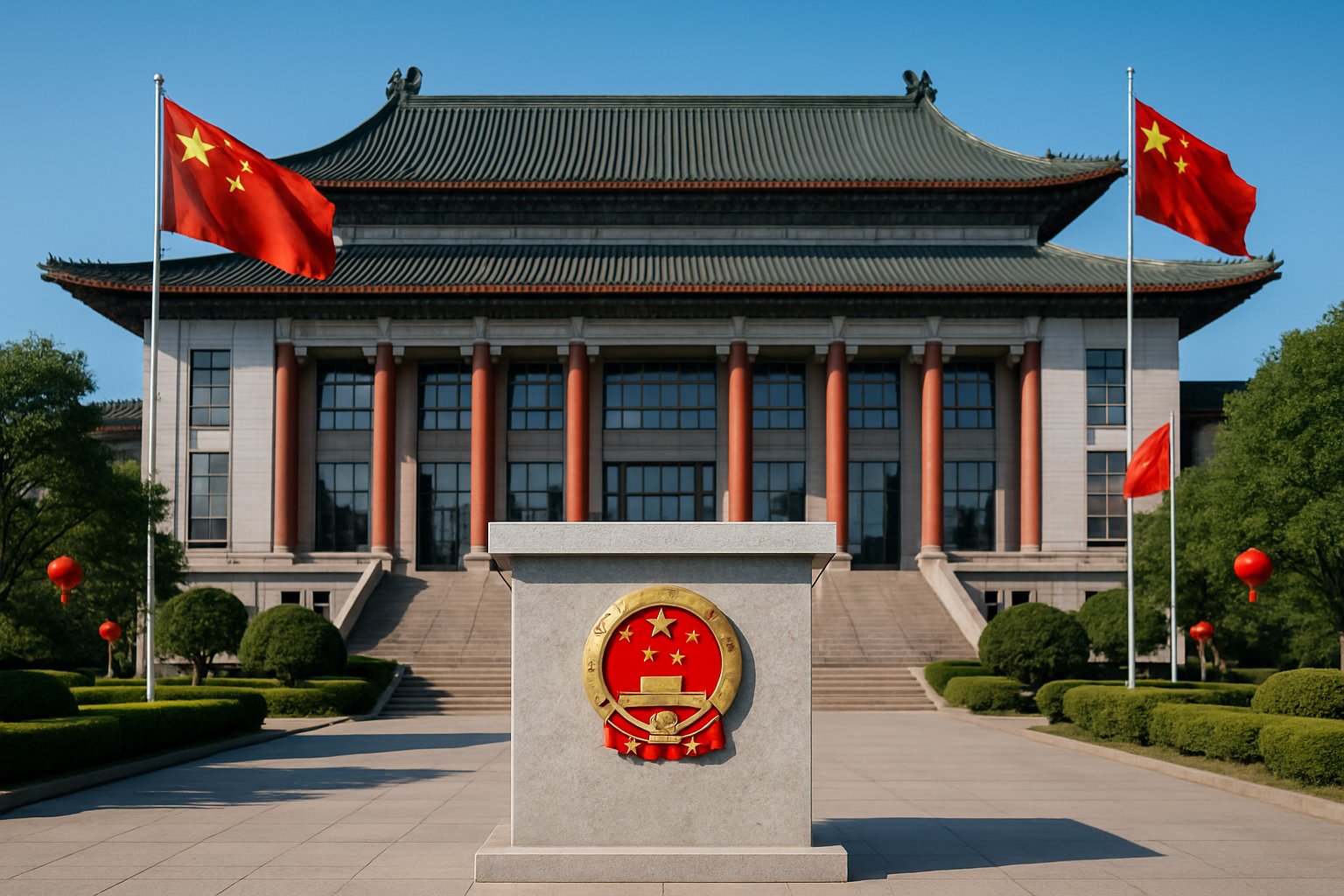The China national security law sits at the heart of how the country protects its core interests—think political system, sovereignty, and territorial integrity. China defines national security in a sweeping way, covering everything from military and economic security to social and cultural stability. That alone shows just how seriously the government takes any threat to unity or development.
Understanding this law gives you a window into how China holds onto power and reacts to challenges, both at home and abroad.
Since 2015, the China national security law has changed the way the country handles governance and legal control. It tightens the Communist Party’s grip and introduces measures that can limit personal freedoms if officials say it’s needed for national security.
If you want to keep up with China’s policies and how it manages risks, you really need to know what this law is all about.
China National Security Law Basics

This law covers a lot—politics, military, economy, technology. It sets out rules to protect China’s sovereignty and the Communist Party’s control.
Officials can take special steps, even limiting individual rights, if they say national security demands it.
What Is China’s 2015 National Security Law?
China’s National Security Law, or 中华人民共和国国家安全法, took effect on July 1, 2015. It’s a pretty broad legal framework, aimed at protecting security in politics, military, economy, culture, technology, and society.
The law defines national security as guarding the regime, sovereignty, unity, and public welfare from danger. Public security and national security agencies get the job of protecting people involved in security work.
The government can take special measures that restrict citizens’ rights, but only within legal limits and if there’s a real security need. The law covers the whole country and backs up China’s efforts to keep long-term stability and control over key areas.
Why It Matters Beyond China’s Borders
This law doesn’t just affect people inside China. Companies and individuals worldwide feel its reach, too. It puts rules on sensitive technologies and military modernization, which makes foreign businesses and governments pay attention.
Foreign companies working in China might have to deal with new security reviews or face pressure to comply with Chinese government demands. That can hit international trade and technology sharing.
The law also says China will guard its interests beyond its borders. That’s a pretty bold signal that China’s taking a more assertive role globally. It shapes how the country interacts with others and manages risks it sees as threats.
National security and cybersecurity go hand in hand. Read: Chinese Cybersecurity Law and Regulations: What You Need To Know.
Broad Scope & Data Powers

The China National Security Law gives authorities sweeping control over politics, economy, technology, and data. It even stretches Chinese law beyond the country’s borders, affecting foreign entities connected to China.
Covers Politics, Economics, Tech, Data Security
The law’s reach is broad. It focuses on protecting political systems, economic interests, tech development, and data security.
In politics, it works to keep the ruling party’s authority safe and block threats like subversion. On the economic front, it targets anything that could harm national industries or disrupt markets.
Technology gets special attention. The law controls innovations, especially those tied to critical infrastructure or military use. Data regulation is strict, especially for "important data" linked to national security.
Authorities can monitor, collect, and manage data inside China. This includes personal info and anything affecting public interests or sovereignty.
Grants Extraterritorial Reach to Chinese Law
Chinese national security law sometimes applies outside China. If your actions abroad harm Chinese national security or legal rights, the law might still catch up with you.
Foreign companies handling data related to China could face Chinese regulations, even if they’re outside the country. This covers cross-border data flows and surveillance, too.
The law broadens “data processing” to cover activities that hurt China’s security or public interests, wherever they happen. That creates compliance headaches for international firms dealing with Chinese data or tech.
Chinese authorities have a lot of leeway in enforcing these rules. They can investigate foreign-held data or technology linked to China as they see fit.
National security impacts how data is handled. For deeper insight, read: Privacy Law: What You Need to Know.
Hong Kong’s National Security Law

The Hong Kong National Security Law (NSL), introduced in 2020, changed the way Hong Kong is governed. It defines national security crimes and gives the government more power to control anything seen as a threat to China’s authority.
You really have to understand its broad reach and the global consequences it’s set off.
2020 Hong Kong NSL With Global Impact
The NSL targets things like secession, subversion, terrorism, and collusion with foreign forces. China pushed it through fast after big protests challenged Beijing’s control.
The law overrides some local Hong Kong laws and runs under China’s national legal system. China has set up new security agencies in Hong Kong, and these agencies can take over certain cases from local courts.
Foreign governments have criticized the law for shrinking Hong Kong’s autonomy and freedoms. The NSL also changed Hong Kong’s international relationships. Many countries have cut back on official ties or changed their trade relations with Hong Kong, seeing it as less independent from China.
This shift is shaking up diplomatic relations and business environments around the world.
Risks for Foreign Businesses and Individuals
If you have business or personal ties to Hong Kong, the NSL brings real risks. Authorities now have broad powers to investigate and punish acts they call harmful to national security. This could include speech, protests, or even contacts with foreign groups.
Foreign companies face uncertainty over legal risks, especially if their operations or staff are seen as interfering in politics. The law has tightened control over foreign NGOs and media, cutting down outside influence on public opinion.
Data privacy demands have gone up, too. If you’re operating in Hong Kong, you might get pressured to share information with local authorities. Legal protections you rely on elsewhere might not hold up here.
Learn more by reading Hong Kong National Security Law: What You Need to Know.
Business & Legal Risks

Running a business in China means dealing with strict government control over information and tough penalties for anything officials see as a threat to national security. These rules affect how you handle data, your legal responsibilities, and even your personal freedom or company assets.
Data Access, Surveillance, Legal Exposure
China makes you store all business data—including tech and personal records—on servers within the country. That gives authorities wide access to inspect your company’s network and data at any time.
You have to follow these rules even if your home country’s privacy laws are stricter. Your data might be accessed without your consent, and you could lose intellectual property or be forced to share technology.
The law says you must avoid any actions that could harm China’s national interests. These interests aren’t clearly defined, so you might face investigations or penalties with little warning.
Potential Detentions, Exit Bans, Asset Freezes
If Chinese authorities suspect you of harming national security, they can detain you. Sometimes, these investigations drag on for a while with no formal charges.
Exit bans can stop you or your employees from leaving China if you’re under investigation. Your business assets could be frozen or seized based on security accusations, which could disrupt your operations overnight.
There’s not much legal recourse, so you really need to understand these risks before you operate in China.
Rules on data storage are changing fast. To stay compliant, read: China Data Localization Laws for Foreign Companies.
Compliance Tips
If you want to follow China’s National Security Law, you’ll need to take some concrete steps. Review your data and legal processes, make sure your team understands the requirements, and check that your contracts and jurisdiction policies match China’s rules.
Conduct Legal Audits and Data Mapping
Start with a detailed legal audit of your operations tied to China. Figure out where you collect, store, or send data that Chinese authorities might care about.
Mapping your data flow helps you spot risks related to national security rules or encryption controls. Focus on data labeled "important" or linked to national security, since these need extra protections and could face government access.
Document what you find so you can show compliance during inspections. Also, check if your encryption tools or chips meet China’s regulations, since officials might demand access or backdoors.
Set Up Training, Contracts, Jurisdiction Review
Train your staff on China’s cybersecurity and national security laws. Make sure they know how to handle sensitive data, spot cyber threats, and report to authorities if there’s a security risk.
Review contracts with suppliers, partners, and clients. Spell out who owns data, how it’s handled, and what happens during security reviews.
Take a hard look at your jurisdiction choices in contracts. China is pushing for local data storage and wants its courts to handle disputes. Limiting disputes to non-Chinese courts might not fly anymore, so adjust your terms to lower legal risks in China.
Legal compliance under China’s security laws often involves SCCs. Learn more by reading SCC China: Understanding Standard Contractual Clauses in China.
Final Thoughts
China’s national security law gives the state wide powers over politics, tech, data, and foreign influence. It allows authorities to detain people, access data, and apply laws beyond China’s borders.
For foreign companies, platforms, or travelers, this raises serious legal and data risks. You may face new rules on data storage, intelligence sharing, and cross-border compliance. Taking action now—like auditing data flows, updating policies, and training your team—can protect your business. It’s not optional; it’s essential.
Need help staying compliant and reducing risk? Contact China Legal Experts to protect your operations and navigate these laws with confidence.
Security extends beyond data—it includes social welfare. Curious? Read Does China Have Social Security? Expert Insights on Chinese Pension.
Frequently Asked Questions
What is the security policy of China?
China’s security policy focuses on protecting its political system, sovereignty, territorial integrity, and economic growth. The government aims to defend national unity and keep social stability through laws and military upgrades.
What is Article 7 of the Chinese national security law?
Article 7 says all organizations and citizens have to support, assist, and cooperate with national security efforts. It’s about everyone sharing the responsibility to protect the country’s core interests.
What is the national security Service in China?
The national security service includes public security and intelligence agencies. They work to stop threats like espionage, terrorism, and subversion of state power.
Can you defend yourself in China?
Yes, Chinese law allows self-defense if you’re facing an immediate unlawful attack. But your response has to be proportional and only enough to stop the threat.
Is fighting a crime in China?
In China, fighting in public usually breaks the law. You can face penalties for it.
If you hurt someone or cause a scene, the police might charge you with a crime. It's not something that authorities take lightly.
Subscribe to receive updates
Subscribe to receive the latest blog posts to your inbox every week.





